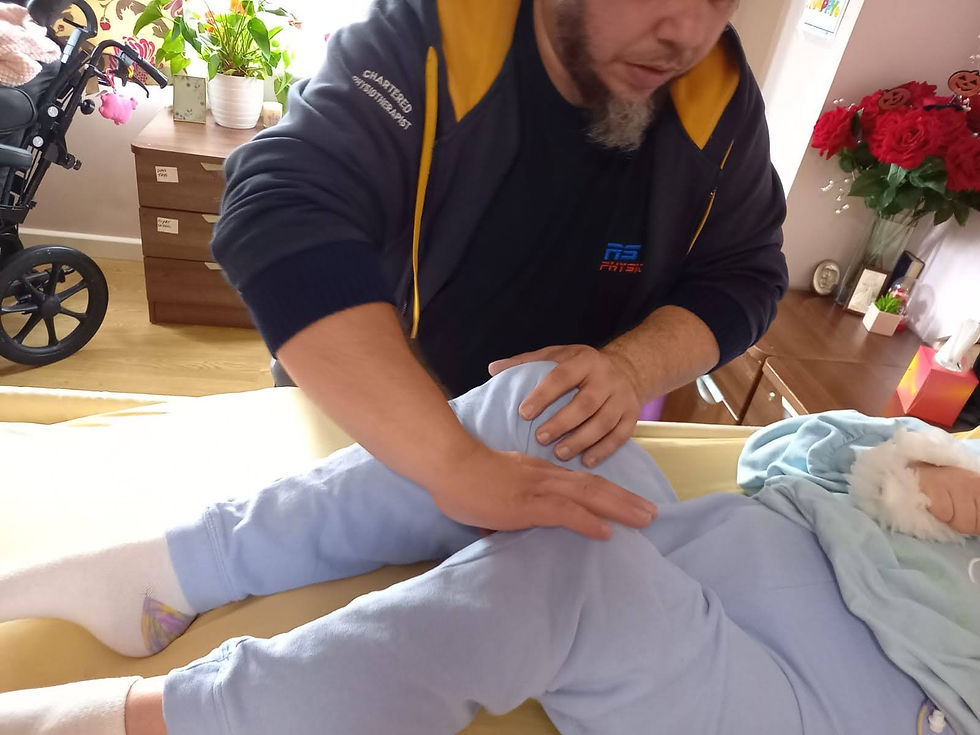The Shocking Link Between Muscle Loss and MS - What You Need to Know
- Pawel Ciecierski MSc Physiotherapy MCSP HCPCreg

- Apr 29, 2023
- 2 min read
As a physiotherapist, I have seen how Multiple Sclerosis (MS) can affect a person's daily life. MS is an autoimmune disease that affects the central nervous system and can lead to muscle weakness and atrophy (Loss of muscle or tissue). Over time, this can result in a loss of muscle mass, strength, and function known as sarcopenia. Sarcopenia can have significant consequences for people with MS, including decreased mobility, increased risk of falls, and decreased quality of life.
Several factors contribute to sarcopenia in MS. Reduced physical activity, immobility, and the use of corticosteroids to manage symptoms can all contribute to muscle loss. Additionally, many people with MS may experience decreased appetite and malnutrition, which can further exacerbate sarcopenia.
The good news is that there are several strategies you can use to prevent and manage sarcopenia. Regular physical activity, including resistance training, has been shown to help maintain muscle mass and function in MS patients (1). Resistance training involves using weights, resistance bands, or bodyweight exercises to challenge the muscles and stimulate growth. Resistance training can also help improve bone density, which is important for MS patients, who may be at increased risk of osteoporosis (2).
A well-balanced diet that includes adequate protein intake can also help prevent sarcopenia in MS patients (3). Protein is essential for building and maintaining muscle mass, and MS patients may need more protein than healthy individuals due to their increased risk of sarcopenia. Protein-rich foods include lean meats, poultry, fish, eggs, dairy products, legumes, and nuts.
If tou have MS, it is important for you to work with healthcare team to develop an exercise and nutrition plan that meets your individual needs. You should also consult your healthcare provider before starting a new exercise program or making significant changes to your diet.
Remember - sarcopenia is a significant concern for people diagnosed with MS , but there are strategies they can use to prevent and manage muscle loss. These three aspects must be your priority - regular physical activity, resistance training, and a well-balanced diet can all help maintain muscle mass and function. By taking proactive steps to prevent sarcopenia, you can improve your quality of life and reduce risk of falls and other complications associated with muscle loss.
References:
Motl RW, Pilutti LA. The benefits of exercise training in multiple sclerosis. Nat Rev Neurol. 2012;8(9):487-97.
Latimer-Cheung AE, Pilutti LA, Hicks AL, et al. Effects of exercise training on fitness, mobility, fatigue, and health-related quality of life among adults with multiple sclerosis: a systematic review to inform guideline development. Arch Phys Med Rehabil. 2013;94(9):1800-28.
Haas CT, Gregory CM. Sarcopenia and disability in multiple sclerosis: a systematic review and meta-analysis. J Neurol Phys Ther. 2017;41(3):151-158.
Fragala, M. S., Clark, M. J., Walsh, S. J., & Kleppinger, A. (2019). Sarcopenia in Older Adults with Multiple Sclerosis. Physical Medicine and Rehabilitation Clinics of North America, 30(4), 743-756. doi: 10.1016/j.pmr.2019.06.002
Briken, S., Rosenkranz, S. C., Keminer, O., & Patra, S. (2021). Resistance Training in Multiple Sclerosis: A Systematic Review and Meta-Analysis. Frontiers in Neurology, 12, 654943. doi: 10.3389/fneur.2021.654943





Comments